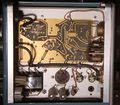111: Difference between revisions
(Pics) |
No edit summary |
||
| Line 1: | Line 1: | ||
{{Instrument Sidebar | |||
|manufacturer=Tektronix | |||
|model=111 | |||
|class=Pulse generator | |||
|series= | |||
|summary=Pretrigger Pulse Generator | |||
|image=Tek 111 front.jpg | |||
|caption=Front View | |||
|introduced=1960 | |||
|discontinued=(?) | |||
|designers= | |||
|manuals= | |||
* [[Media:070-252.pdf|Tektronix 111 Manual]] (PDF) | |||
* [http://w140.com/tek_fcp/tek_type_111_factory_cal_proc.pdf Tektronix 111 Factory Calibration Procedure (PDF)] | |||
}} | |||
The '''Tektronix Type 111 Pretrigger Pulse Generator''' produces two pulse signals, one to trigger an oscilloscope sweep and a main output pulse to stimulate the device under test. | The '''Tektronix Type 111 Pretrigger Pulse Generator''' produces two pulse signals, one to trigger an oscilloscope sweep and a main output pulse to stimulate the device under test. | ||
| Line 12: | Line 27: | ||
==Internals== | ==Internals== | ||
The main output pulse of the Type 111 is produced by an avalanche transistor. | The main output pulse of the Type 111 is produced by an avalanche transistor. | ||
==Notes== | ==Notes== | ||
| Line 36: | Line 47: | ||
[[Category:Pulse generators]] | [[Category:Pulse generators]] | ||
Revision as of 08:51, 17 August 2021
The Tektronix Type 111 Pretrigger Pulse Generator produces two pulse signals, one to trigger an oscilloscope sweep and a main output pulse to stimulate the device under test.
The trigger pulse comes between 30 and 250 nanoseconds before the output pulse; this is controlled by a knob on the 111. This gives adequate time for the oscilloscope to start sweeping so that the leading edge of the input or output signals of the device under test can be viewed. The alternative is to have a delay line in the signal path, after the trigger pickoff, but delay lines degrade transient performance. Using a pretrigger eliminates the need for a delay line in the vertical signal path and therefore enables accurate high-speed measurements. For a stable display, low jitter of the delay between pretrigger and main pulse is essential.
Key Specifications
| Pulse repetition rate | 10 Hz to 100 kHz, or by external trigger |
|---|---|
| Rise time | <500 ps |
| Pre-trigger | 30−250 ns variable with additional calibrated "+1 ns" switch, jitter ≤100 ps |
| Output amplitude | ≥10 V (selectable polarity) into 50 Ω |
Internals
The main output pulse of the Type 111 is produced by an avalanche transistor.
Notes
The Auxiliary Equipment section in the Type N manual says the rise time is 300 ps. The 111 front panel and manual specify <500 ps.
Pictures
-
Front View
-
Front
-
Left Internal View
-
Left Internal View
-
Right Internal View
-
Right Internal View
-
Late serial number rear view
-
Rear
-
Early serial number rear view
-
Schematic
-











